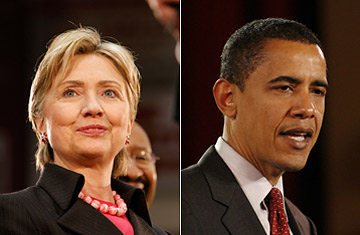
Hillary Clinton and Barack Obama
Barack Obama raised more than $30 million in the month of March, a campaign official told TIME on Tuesday.
Though the official would not provide an exact number, he did say, "The number starts with a three and we are still counting. It's in the 30s."
While a monthly fund-raising total of $30 million or more would be well short of the more than $55 million Obama raised during the month of February, it would still represent nearly $1 million a day — a healthy pace for a campaign that has had a politically rocky last few weeks. And it likely ensures that Obama will be able to afford large TV and radio advertising buys in the remaining primary states, the official claimed.
As of Tuesday night, the Clinton campaign had not released its March totals. But one Clinton campaign adviser hinted that the New York Senator's total for the month will come close to $20 million. That estimate could not be independently confirmed.
Word of Obama's latest financial benchmark comes amid continued reports that the Clinton campaign is struggling with a persistent debt that at times has reached nearly $9 million, according to published reports and Democratic party officials. The size of Clinton's debt, in turn, has given rise to questions about whether she will have the cash to compete head-to-head with Obama in various primaries in the final eight weeks of the nomination campaign.
Sen. Clinton loaned herself $5 million earlier this year when her campaign stumbled, fund raising slowed and her cash on hand dwindled. There have been scattered reports in recent weeks that various campaign vendors have not been paid for work or services that have already been rendered, with some taking to the airwaves to complain.
Debt is not uncommon in presidential campaigns, and often is carried quietly on a campaign treasurer's books for a few weeks. Creditors go unpaid, staffers can work for free; small costs can even be borne on personal credit cards for a brief period of time. These and other tactics are almost always employed at one time or another by most presidential operations to get through tight spots. But the debts tend to be short-lived and modest, rarely exceeding a few million dollars. While the exact size of Clinton's debt has fluctuated, Democratic party officials say, hers remains above the norm in size for a campaign at this stage of a race.
While some inside the campaign are concerned about whether Clinton will have the funds to match Obama in radio and TV advertising buys through May, others are worried about a different horizon. One Clinton adviser wondered whether that what he called the "massive debt" was beginning to hang over not simply the campaign but Clinton's political future. How, this adviser asked, can the campaign climb out of "the debt hole if we don't win this whole thing?" Facing a Senate reelection campaign in 2012, he noted, Clinton's choice is daunting: "If you have a $10 million debt when this thing is over, she has to pay it off, and then, four years later, raise $30 to $40 million" to wage a reelection campaign.
There was little to suggest in the latest financial reports that a lack of money could drive Clinton from the race soon. A $20 million month, though less than Obama's total, would under any other circumstances be a respectable total for a political fund-raising operation. But it would nonetheless leave Clinton a step or two behind Obama in a another vital political metric: financial strength. A lingering debt, meanwhile, would mean that Clinton could face a longer-term consequence of an extended campaign.
